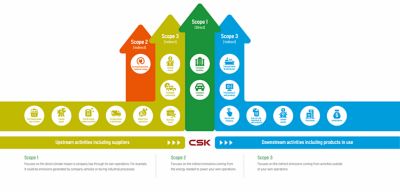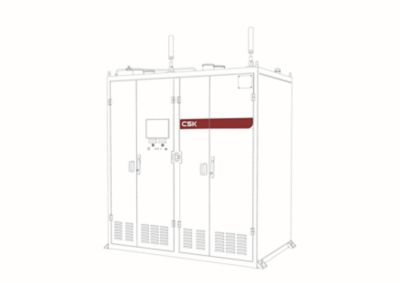Pure and Agile
Science Based Targets (SBT)
To achieve successful carbon reduction, as part of the Atlas Copco Group, CSK has set Science Based Targets (SBTs) and aims to reduce 46% of carbon emissions from its own operations by 2030 and 28% from its value chain and the carbon used in its products by 2030 to reduce the impact of carbon emissions.

Target 1: Emissions from our own operations and purchased energy
- Replace company vehicles with low-carbon vehicles.
- Reduce carbon emissions from our material supply chain.
- Reuse and recycle water used in manufacturing processes.
- Reuse and recycle materials used in manufacturing and packaging.
- Converting energy used at the plant to renewable energy.
Target 2: Indirect Emissions Outside Our Control Area
- Continuously increase the energy efficiency of our products and ensure that they are used and maintained in an optimal manner.
- Design equipment that is powered by electricity rather than fossil fuels.
- Support our customers in converting energy within their operations to green energy sources, and work with local energy providers to increase access to green energy on a local and global level.
KRE 100 Contract
Since 2021, CSK Yongin has been using renewable energy through a contract with KEPCO (Korea Electric Power Corporation) under the <Green Premium>.
*Energy CO2: Electricity – scope 2

| Year | 100% Renewable Electricity (MWh/year) | CO2 Emission Reduction (tCO2/year) | CO2 Reduction Rate for Electricity |
|---|---|---|---|
| 2021 | 1,140 | 521 | 93.5% |
| 2022 | 1,174 | 537 | 100% |
| 2023 | 1,235 | 564 | 100% (forecast) |
Next-Generation Non-Fuel Abatement Technology

CSK has developed the 'Next-Generation Non-Fuel Abatement' to align with the global trend of carbon neutralization and reduction.
- 4th generation plasma torch for stable output and flame stabilization, maximizing consumable MTBF.
- Power Consumption Reduction System (PCSS) as a standard feature.
- Increased gas capacity and processing efficiency.
- Effective carbon monoxide (CO), nitrogen oxides (NOx), and total hydrocarbon (THC) emissions reduction.
- Enhanced PM cycle.
- Improved corrosion protection.
- Improved powder separation emissions performance.

